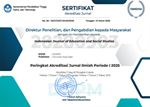Affifah, F. P. (2022). Perempuan pedagang dan kontribusinya dalam ekonomi keluarga. Jurnal Pendidikan Kewarganegaraan, 3(4).
Anisamartiah, I., Ismulyani, H., & Inonu, S. (2022). Kontribusi pendapatan wanita pedagang sayur terhadap pendapatan keluarga. Jurnal Pendidikan dan Konseling, 4(3).
Anshari, D. (2022). Peran Koperasi Simpan Pinjam Pembiayaan Syariah (KSPPS) Keluarga Sehati Al-Ikhwan terhadap peningkatan pendapatan usaha mikro (UM) di Keluarga Taman Sari Kota Mataram (Skripsi, Universitas Islam Negeri Mataram).
Apriyanti, D. (2023). Kondisi sosial ekonomi pekerja wanita sektor informal di Kecamatan Talang Ubi. Jurnal Swarnabhumi: Jurnal Geografi dan Pembelajaran Geografi, 5(1). https://doi.org/10.31851/swarnabhumi.v5i1.4135
Armansyah, & Sukamdi. (2021). Formalisasi sektor informal: Proses, faktor pengaruh, dan dampak pada pelaku usaha sektor informal di Kota Palembang. Jurnal Kependudukan Indonesia, 16(1). https://doi.org/10.14203/jki.v16i1.501
Feldkircher, M., & Teliha, V. (2024). Speeches in the green: The political discourse of green central banking. Energy Economics, 135, 107646. https://doi.org/10.1016/j.eneco.2024.107646
Ghore, Y., Long, B., Ozkok, Z., & Derici, D. (2023). Rethinking human capital: Perspectives from women working in the informal economy. Development Policy Review, 41(5), e12705. https://doi.org/10.1111/dpr.12705
Handri, R., & Syafril, R. (2024). Peran Lembaga Bantuan Hukum (LBH) dalam memberikan bantuan hukum terhadap rakyat miskin di Kota Padang. Arus Jurnal Sosial dan Humaniora, 4(3), 1842-1850. https://doi.org/10.57250/ajsh.v4i3.770
Harakan, A., Hilman, Y. A., Karso, A. J., Awaluddin, A., Nurhalijah, N., Muin, I. S., ... & Hardi, R. (2025). Inter-agency collaboration in building urban fire resilience in Indonesia: how do metropolitan cities address it?. Frontiers in Sustainable Cities, 7, 1492869. https://doi.org/10.3389/frsc.2025.1492869
Khasanah, & Listia, F. A. (2018). Pengaruh modal, lama usaha dan lokasi terhadap pendapatan pedagang pasar pasca relokasi. Jurnal Pendidikan Ekonomi dan Bisnis, 6, 1–14. https://doi.org/10.21009/JPEB.006.1.1
Manik, N., & Nst, A. (2023). Perlindungan hukum bagi tenaga kerja perempuan di sektor informal. Al-Zayn: Jurnal Ilmu Sosial & Hukum, 3(3), 1344–1358. https://doi.org/10.61104/alz.v3i3.1344
Mramba, N. R. (2024). Exploring Work-Life Balance among Women Entrepreneurs of Food Vending Business in Africa. Review of Business and Economics Studies, 12(1), 25-36. https://doi.org/10.26794/2308-944X-2024-12-1-25-36
Nurhasanah, O., & Syafril, R. (2025). Analisis Peran Dinas Pemberdayaan Perempuan & Perlindungan Anak Kota Padang dalam Menangani Kasus Kekerasan Seksual terhadap Anak di Lingkungan Keluarga Kota Padang. Santhet: Jurnal Sejarah Pendidikan dan Humaniora, 9(3), 808–814. https://doi.org/10.36526/santhet.v9i3.5414
Peprah, C., Peprah, V., & Ocloo, K. A. (2023). Improving the socio-economic welfare of women through informal sector activities in Ghana. Environment, Development and Sustainability, 25(4), 3005-3028. https://doi.org/10.1007/s10668-022-02161-5
Purwaningsih, V. T. (2020). Perempuan dan kesejahteraan rumah tangga sektor informal di Indonesia. Jurnal Ekonomi Indonesia, 10(1), 61–78. https://doi.org/10.52813/jei.v10i1.61
Rani. (2019). Pengaruh modal dan lama usaha terhadap pendapatan pedagang di pasar tradisional Pasar Minggu. Jurnal Sekretari dan Manajemen, 1, 143–148. https://doi.org/10.31294/widyacipta.v3i1.5264
Renjani, D. A. (2024). Faktor yang berhubungan dengan kelelahan kerja pada petugas kebersihan di RSUD Latemmamala Kabupaten Soppeng (Doctoral dissertation, Universitas Hasanuddin).
Rosalina, H. N., & Setyawanta, L. T. (2020). Perlindungan hukum terhadap pekerja migran sektor informal dalam perspektif teori bekerjanya hukum di masyarakat. Jurnal Pembangunan Hukum Indonesia, 2(2), 174–187. https://doi.org/10.14710/jphi.v2i2.174-187
Rusydi, B. U., Heriani, A. M., & Siradjuddin, S. (2023). Menyoal marginalisasi dan kesejahteraan pekerja perempuan sektor informal. EcceS: Economics Social and Development Studies, 5(1). https://doi.org/10.24252/ecc.v5i1.5241
Sari, M., & Adi, A. S. (2020). Peran pemerintah desa dalam membentuk kesadaran jaminan sosial ketenagakerjaan (Jamsostek) bagi masyarakat pekerja sektor informal di Desa Socorejo Kecamatan Jenu Kabupaten Tuban. Kajian Moral dan Kewarganegaraan, 8(2), 121–137.
Sherwani, F. K., Shaikh, S. Z., Behal, S., & Siddiqui, M. S. (2024). Determinants of financial inclusion among women-owned enterprises: a case study of the informal sector. Arab Gulf Journal of Scientific Research, 42(4), 1340-1358. https://doi.org/10.1108/AGJSR-05-2023-0193
Sifullah, M. K., Sohel, M. S., Sarker, M. F. H., Islam, M., Ahmad, M., & Rahman, M. M. (2023). Mapping out the vulnerabilities of migrant women in the informal sector: A qualitative investigation in Dhaka city. Heliyon, 9(10). https://doi.org/10.1016/j.heliyon.2023.e20950
 (Universitas Negeri Padang)
(Universitas Negeri Padang) 



